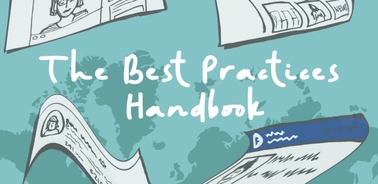- Home
- Fighting Fake News And Protecting Fact-checkers
Fighting fake news and protecting fact-checkers

Three former students from the Master in International Development—Reyung Cho, Andrew Moorman and Dominic Johnson-Kerr—worked on their capstone project in collaboration with the International Fact-Checking Network and their tutor, D.J. Flynn, Assistant Professor of Political Science at IE University.
Their project, entitled “The Best Practices Handbook,” explored the policy recommendations, guidelines, and strategies necessary to keep fact-checkers safe and combat fake news. Read on to find out more about their project.
Fake news and the spread of misinformation have changed the way we understand the world around us. Posing a significant threat to free democratic principles, fake news has polarized politics and divided societies around the world. Fact-checkers have emerged in this fight to ensure the public has access to accurate data. Some of their efforts have been met with resistance and threats, leading this Master in International Development team to investigate the best policies and methods for protecting fact-checkers—while they protect the public.
Why did you create this project?
The birth of social media sites like Facebook, Instagram and Twitter has transformed the way we consume information and interact. Different actors now use social media to sway public opinion. By tweaking information to fit a desired narrative, they can have a widespread impact on the public while appearing to be credible. This is where the problem of misinformation and fake news comes into play. Misinformation breeds polarized politics, and polarized politics breeds misinformation. In combination with other factors like confirmation bias and echo chambers, this cycle has contributed to the polarized political divide the world sees today.
Fact-checking organizations have emerged as an essential tool to stem the tide of misinformation. Unfortunately, as a result of their actions, fact-checkers have been subject to threats from those in power and also the public. As a result, fact-checking organizations have been forced to battle not only those they are trying to keep accountable, but also those they are trying to protect. It is this rise in attacks that led the IE School of Global & Public Affairs to join the International Fact-Checking Network (IFCN) at Poynter University and their global network of journalists.
Our goal was to provide the International Fact-Checking Network and their community of fact-checking agencies with the best information and tools possible so they can safely do their jobs and defend the spread of truthful information.
What were the main challenges of this project?
There were five main challenges in completing this project: scheduling around a full-time master’s program; organizing meetings across time zones that ranged from Brazil to the Philippines; the fact-checking organizations’ availability; language differences; and organizations not replying or agreeing to work with us. The team had to be very flexible to overcome these challenges, often working late at night or conducting early-morning interviews.
After working through the list of fact-checker organizations provided by the IFCN, we needed to carry out further research into regions that weren’t covered by the initial interviews. In order to have a basis for comparison, we reached out to organizations in countries where fewer attacks are taking place. This was another challenge, as we had to go back to step one and face those initial five challenges again.
Once we finished these additional interviews, the team proceeded to benchmark the organizations against each other. Most of the findings were circumstantial and trying to find the root cause of the threat was the challenging part. We had to investigate the politics, customs, tradition and history of the country and organization to understand the origins of the threats and the trends that followed.
We then got to work researching and developing policies that could be used to mitigate these threats. Organizations often developed their own methods for defending against attacks, and these would be useful in other contexts and countries as well. We identified organizations’ leading practices while comparing this with the benchmark, and built a general set of recommendations. Not all the practices were suitable for every organization, and trying to find common ground and provide generalized recommendations was difficult.
How was the work divided amongst the team?
Work was divided according to team members’ strengths and backgrounds, with everyone pitching in. One of Dominic Johnson’s responsibilities was to create the Hate-Check Book’s website, which features a free downloadable PDF copy of the work, so that fact-checkers have easy access to these resources. Among other tasks, Reyung Cho synthesized the information collected and further codified the research so that practical examples could be used while allowing the organizations to remain anonymous. As a Spanish speaker, Reyung coordinated with Spanish organizations. Finally, one of Andrew Moorman’s projects was to conduct the English interviews and synthesize transcripts. Additionally, he used his experience to develop the practical safety recommendations that both mitigated risks and took future challenges into account.
What does the future hold for this project?
As a new and evolving field, fact-checking is an area of journalism that we foresee being indispensable to the future of information sharing, especially with the rise of political polarization. The future of fact-checking is bright, with huge, untapped potential for securing partnerships with mainstream news organizations or expanding upon existing social media partnerships, such as Facebook's Third-Party Fact-Checking Program and the Google News Initiative.
We are optimistic that our efforts and the vital work of fact-checkers will continue to improve individuals’ decision-making, providing them with better information and tools to shape their future.
To learn more about this project visit their website and to read the whole project visit this link.
